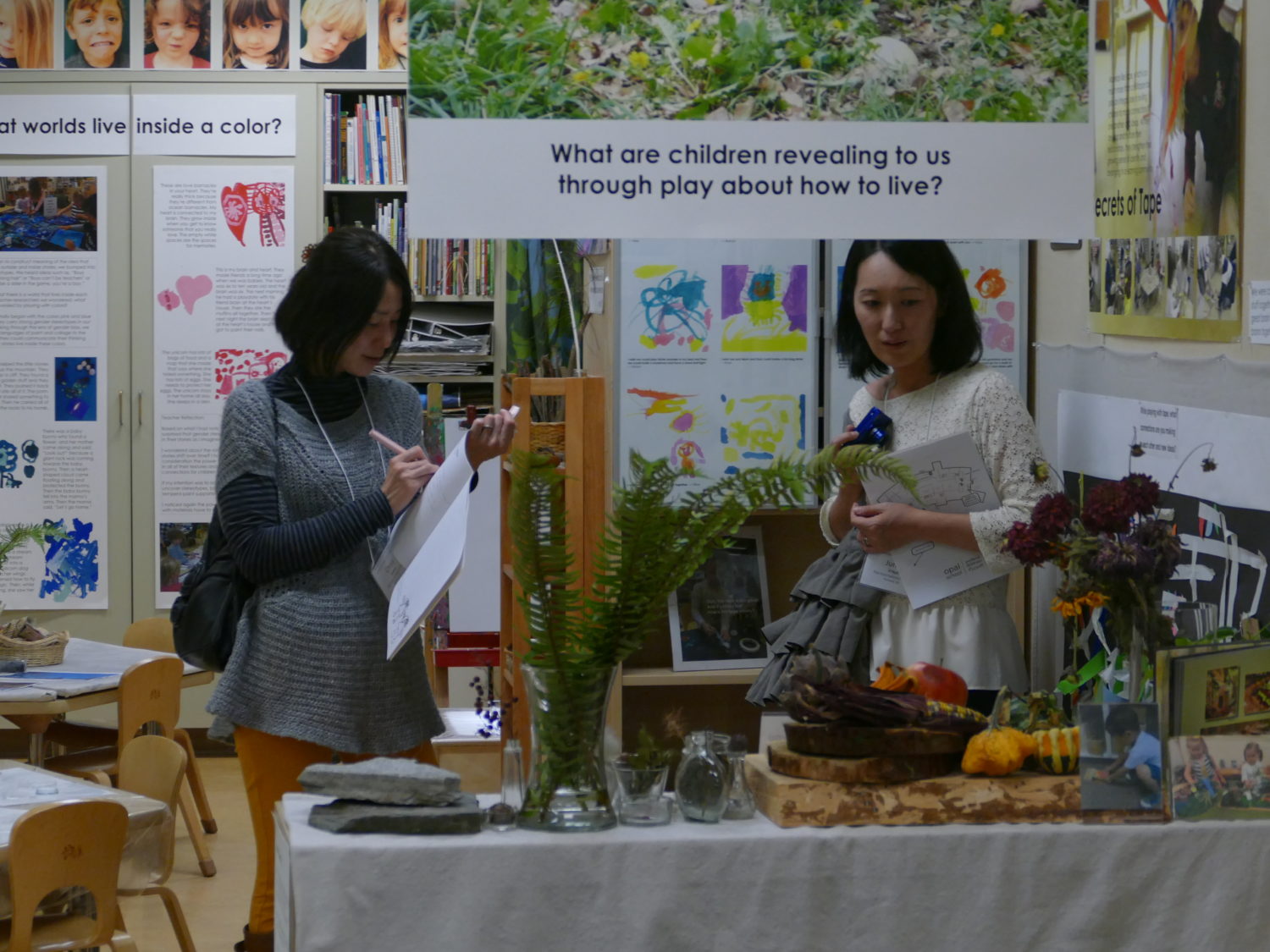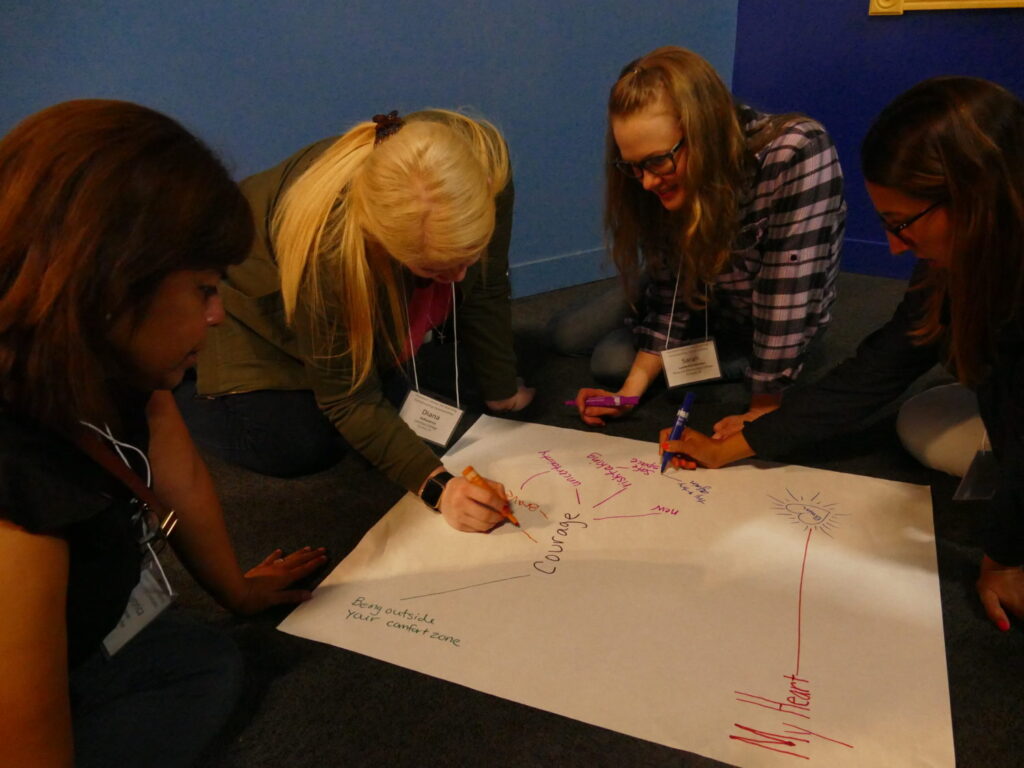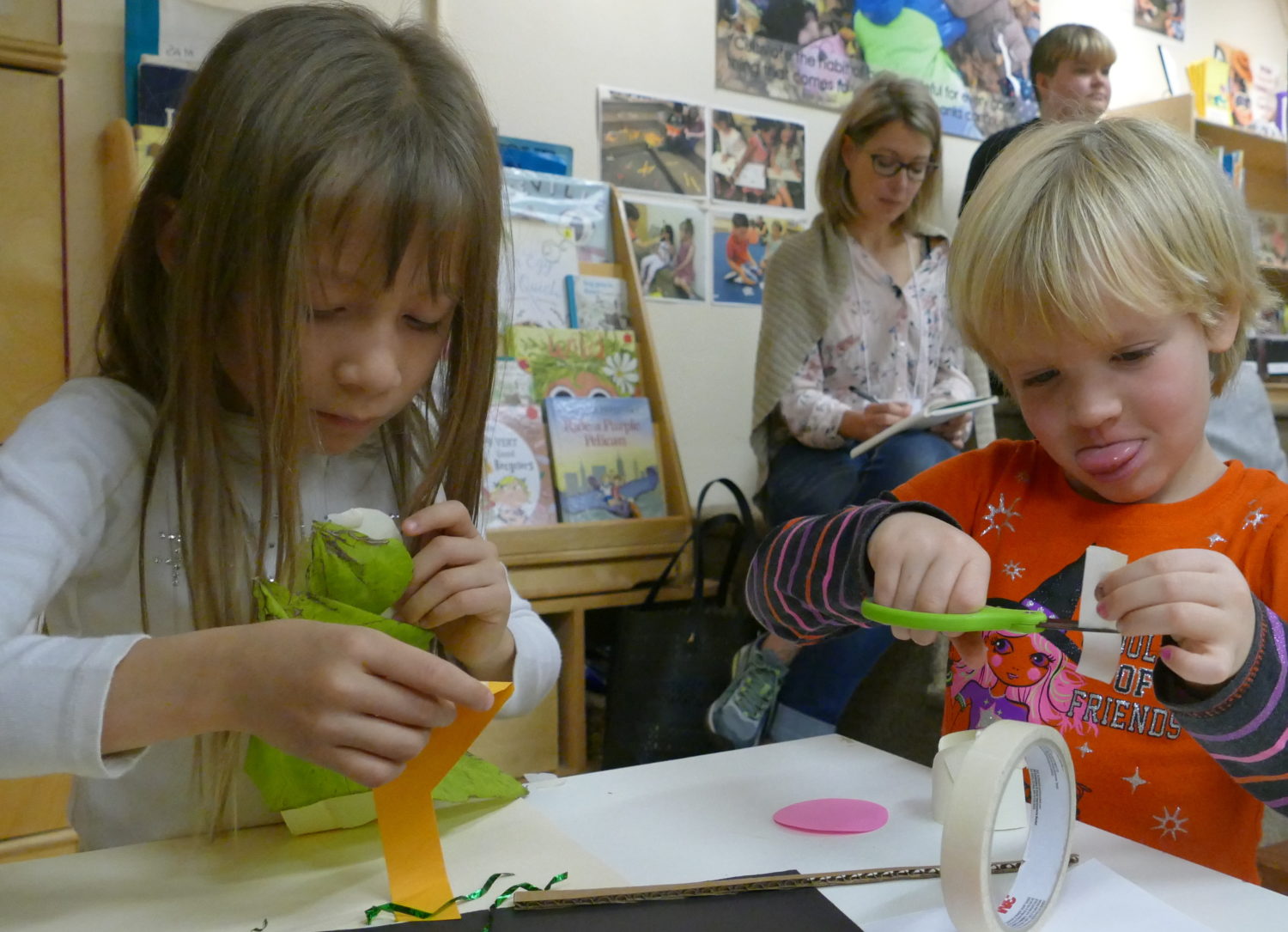Courageous and Collaborative Communities: A report from the workshop

Vulnerability sounds like truth and feels like courage. Truth and courage aren’t always comfortable, but they’re never weakness.
Brené Brown
Last week, we hosted the first of this year’s Opal School Visitation Days workshops. This one brought together 70 educators from diverse contexts – pre-k and elementary, rural and urban, public and private, multilingual and monolingual, largely from Oregon but also from California, Washington, Arizona, Oklahoma, and British Columbia – to think about the characteristics, cultivation, and role of courageous, collaborative learning communities.
There were many aspects of the workshop that were new for us at Opal School. We hadn’t previously organized a session around this question, nor had we offered a workshop that includes classroom observation so early in the school year. Recognizing that it would be hard for teachers to steal time away from their students in October, we had only one day of classroom observations rather than the two we typically schedule for. We kept presentations brief and designed for extensive group work. As always, we learned alongside the visiting educators. One of them wrote,
There is a distinct lack of presumption in this workshop – a lack of ‘look at us! We’re doing it right! Do it like we do!’ Instead, your openness with sharing your own discomforts and challenges and questions does well to both demonstrate and validate your approach.
A few snapshots:
To prepare for the workshop, we asked participants to read Opal School’s mission, values, guiding principles, goals and expectations for students, and definition of Playful Inquiry and watch Brené Brown’s SxSWedu17 keynote. The first document provides participants with a lens through which to understand Opal School’s intentions. Brown’s talk introduces the fundamental role of vulnerability in supporting relationships and learning. That idea of vulnerability came up repeatedly – most particularly in the deepening understanding that supporting courage and collaboration demands not only that children are vulnerable, but that teachers are, too. On Saturday, an elementary teacher addressed the group saying,
I feel like I’m having an aha moment. I thought that my job was being in control of the classroom – and now I realize that’s impossible for learning, and I’m feeling disequilibrium about that. For the first time, I understand that’s what vulnerability in teaching means.

Thursday night, we began the workshop by exploring Opal School classroom environments and returned to form groups with people unknown to each other and crack open the words Community, Courage, and Collaboration. One participant told me that she was struck by how exciting it was to meet people from far and wide who all had similar connections to those words. I suggested that although we might share the same language, I imagined that very different experiences and understandings lived beneath those words – and that our experiences in the coming days might reveal those different perspectives. She later wrote,
The tangibility of the experiences and stories that I walk away with is so important. My own feelings and reflections on the invention challenge paired with the Opal classroom learning stories really brought Brené Brown’s words to life.
You got us all on the same page on Thursday night within our groups, then actually made us do it on Friday with the invention challenge.
It worked really well to hear short, powerful stories and then be able to tie that together with our own work in groups. The short length of the presentations paired with the long stretches of actual collaborative, courageous community work helped me dig so deep into the meaning and purpose. This was so much more effective than hearing strings of long presentations loosely held together by a theme I don’t feel connected to: you guys made me CARE about courageous, collaborative communities.
The presentations described above offered insight into a range of classroom experiences. We heard about how a pair of children’s struggle through working together became a point of reflection for the classroom community; how a group created powerful through-lines through individual, local, and global landscapes to understand the tension between intention and impact; how a teacher turned to a young child to learn more about how to solve problems and sustain play. Each of these presentations will eventually be available here at opalschooldev.wpengine.com or eventually through the Opal Interactive Archive Project.

Friday morning, we observed Opal School in session. For many participants, this is a fundamental, immersive part of the experience. One participant wrote,
Walking through and simply observing the classrooms is what is giving me a bang for my money. I need to see it in action in order to process and analyze deeply… Seeing the [elementary] students leading the conversations by responding, adding, disagreeing, and asking probing/clarifying questions was amazing. Then, observing 3 year-olds resolve a problem using inquiry was even more incredible to see. Seeing this in action, my thoughts are now outside the box wondering how I can build such strong communities, collaboration, and courage amongst my students.

In addition to hearing stories from Opal School classrooms and observing them in session, we wanted to inspire deeper thinking through actual practice. As we prepared for the session, we were developing our own theories about the relationships between community, collaboration, and courage. We began to realize that if you want to have strong communities, you need to provide people with ways to practice collaboration and courage, and if you want to support people to develop their collaboration and courage, the optimal way to do that is in community. We challenged participants by arranging them in groups with strangers and offering them a context within which to problem-solve. This direct experience sparked reflections that have important implications to practice:
I felt a roller coaster of emotions. I felt fear as people shouted ideas, because I felt intimidated. It took courage to admit that I had something to offer. When an idea popped together I felt proud that we kept at it.
My understandings of the relationships between community, courage, and collaboration has been transformed to a degree of near 180 – these words are more than a string of alliteration.
Thank you for supporting our thoughts around vulnerability by helping us work through the process and truly feeling a variety of emotions and providing lots of supports during the journey. It was a transformative experience.
Throughout our time together, we talked about how important it is for us at Opal School to be aware of our intentions. In the absence of a standardized, predetermined curriculum, knowing those intentions is essential. The workshop culminated with asking participants to be inspired by our letters of intention to write their own.
When I’ve visited Opal School previously, I was mesmerized and focused on the aesthetic. This time, my focus turned towards the community and the language they use with one another… The focus on relationships of collaboration rather than curriculum that holds no meaning is most valuable.
[I feel] extremely inspired, reinvigorated to take risks moving forward in a pedagogy of inquiry… I’m most energized to turn my focus primarily on building a community while learning together through inquiry.
[We need to think more about] learning with children – less teaching at children… What is the learning and growth that can come out of an authentic experience that is offered the opportunity to unfold? Likely, positives that are delightful and surprising.
In a way, I wish I could start my career all over. In other ways, the experiences of this workshop were layered on top of and with my teaching/collaborating experiences over the last 25 years. So, no starting over, just finding a way to authentically extend my practice and nourish my teaching and personal soul so I can nourish children’s souls – and encourage them to nourish each other.
We’re excited to hear stories over the coming months of how those newly articulated intentions guide new possibilities in a range of settings!
